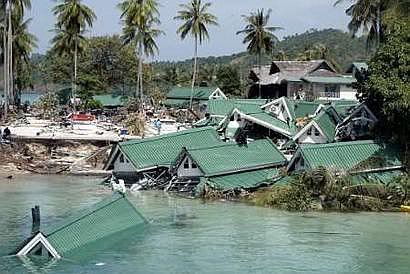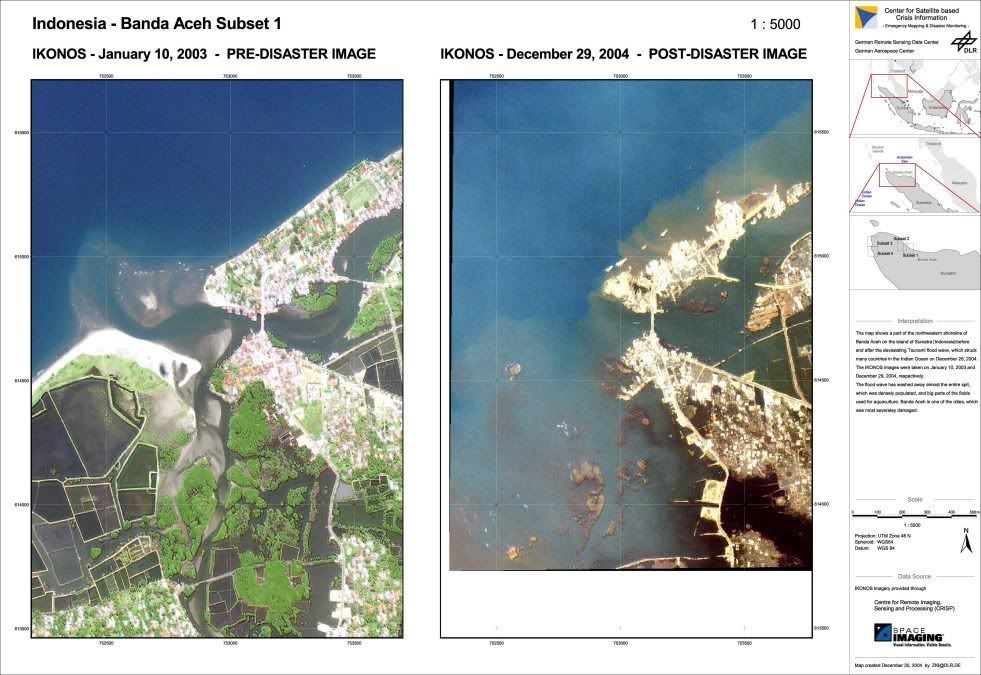Update On South-East Asian Tsunami Recovery
Last night, following a Hawaii Multi-Faith Leadership Forum program that updated us on the disaster recovery process in Indonesia and Thailand (following the earthquake and tsunami that killed over 200,000 people last December), I was privileged to take our two special guests out to dinner.
South-West Coast of Thailand
 From Dr. Bunchar Pangpanich I learned that, in Thailand, at least, the recovery from the tsunami (that killed 5,000 people there, half of them European tourists…..mostly Scandinavian) is going well. Housing has been largely rebuilt and schools are once again up and running. The focus of his agency, the Free Andaman Network, is on economic and social recovery for the coastal peoples.
From Dr. Bunchar Pangpanich I learned that, in Thailand, at least, the recovery from the tsunami (that killed 5,000 people there, half of them European tourists…..mostly Scandinavian) is going well. Housing has been largely rebuilt and schools are once again up and running. The focus of his agency, the Free Andaman Network, is on economic and social recovery for the coastal peoples.Those who live off of the sea in that part of Thailand are largely Muslim. There is also a gypsy-type ocean culture called the Moken who were also dramatically impacted by the devastation.
The first part of Free Andaman plan has been to build and rebuild fishing boats/canoes to replace those that were destroyed. Many boat-building “shipyards” have been financed for this purpose. Some have been so productive that, after replacing local area boats have been contracted by the Thai government to build boats for other areas, too.
Prior to the tsunami, the homes of most villagers stood on land that had never been processed into actual legal title for those who lived there for generations (the title process is too expensive for these poor people). Following the tsunami it has not only been difficult to determine where individual homes had once stood, but business interests, hoping to capitalize on the disaster, have shown up holding legal “documentation” that purports to show that they are the land owners. These folks would like to develop the beachfront land for resorts and other economic purposes. The government smiles on this and, unfortunately, looks the other way, leaving the poor fisher-folks to fight it out on their own.
Fortunately, according to Dr. Pongpanich, the courts are independent enough to sort out the competing claims with some fairness….but only when groups like his intercede and organize the local people to stand up and defend their rights.
As villages become reorganized around these common needs and concerns local, democratic methods of self-government are beginning to emerge, empowering the villagers even more. These people do not want or need a handout any more, according to Pongpanich. Local relief and reconstruction agencies already have more than enough money to finish up the work and the real need is in community organization and development, something his agency is busy doing. (“Perhaps you might consider sending your money to Indonesia where it is more desperately needed,” he said.)
Dr. Pongpanich indicated that he did not ever anticipate that his organization would become a permanent “NGO” (non-governmental organization) but was willing to allow it to complete its work over the next 12-16 months and then dissolve.
His personal plan, at that point, is to become a Buddhist monk and develop his spiritual life and disciplines in a deeper way.
As a fully-trained and licensed medical doctor (trained at the Presbyterian Medical School in Changmai) he has already given up that practice in order to serve the larger social and economic needs of the tsunami-impacted coastal communities. It is not surprising to me that he would be willing to give up and let go of this as well for a time of personal and spiritual introspection, refreshment and renewal.
One interesting side note is that his family household includes four Muslims, three Christians (Presbyterians) and three Buddhists, including himself. It is his impression that the recent highly publicized murders by Muslim radicals of local Thai’s have been carried out by a very small and marginalized number of people. Local Muslim leaders have publicly condemned such actions. He also shared his belief that at least ½ of these killings have been of a personal nature rather than from religious zealotry.
Aceh Province, Northern Sumatra, Indonesia
Click photo to enlarge
The Rev. Dr. Edison Munthe, an Indonesian Lutheran pastor, had a somewhat different story to tell of the situation in Aceh Province in northern Sumatra. Although houses are being rebuilt with both government and non-government assistance, vast numbers of displaced people, (almost all of them Muslim) are still living in tents set up at refugee camps.
The earthquake that followed the tsunami by several months damaged and destroyed many buildings, schools, mosques, businesses and other infrastructure far inland, making the job of rebuilding communities and lives all the more difficult.
As in Thailand, business ventures, with the tacit support of governmental agents and members of the Indonesian military, have seized land that had previously been covered with individual homes and entire villages. This has left thousands of tsunami victims with no place to go home to and no place to rebuild their lives.
Apparently there is a national history of the people of Aceh being treated less fairly than those in other regions of Indonesia. This precedent, enhanced by the presence of drug running and corrupted government officials, has prevented any genuine return to normalcy in the area.
Basic humanitarian needs are still unmet for many thousands of people. Local Christian pastors, while representing a small minority of the population, have been major conduits of money and provisions. They are, in turn, highly respected and accepted by the Muslim majority.
The earthquake that followed the tsunami by several months damaged and destroyed many buildings, schools, mosques, businesses and other infrastructure far inland, making the job of rebuilding communities and lives all the more difficult.
As in Thailand, business ventures, with the tacit support of governmental agents and members of the Indonesian military, have seized land that had previously been covered with individual homes and entire villages. This has left thousands of tsunami victims with no place to go home to and no place to rebuild their lives.
Apparently there is a national history of the people of Aceh being treated less fairly than those in other regions of Indonesia. This precedent, enhanced by the presence of drug running and corrupted government officials, has prevented any genuine return to normalcy in the area.
Basic humanitarian needs are still unmet for many thousands of people. Local Christian pastors, while representing a small minority of the population, have been major conduits of money and provisions. They are, in turn, highly respected and accepted by the Muslim majority.
Common Themes
Both men commented on the obvious: Providing support through private agencies (NGOs) is far more efficient than going through government channels. Not all NGOs have local leadership, however, and either are unable to carry through on their plans or are unable to transport needed materials from Jakarta, for example, to Aceh.
For the most part, now that the initial crisis has passed, cash donations are preferred over material ones. Shipping and transporting these materials is costly and difficult. Cash, however, is easily traded for the things that are actually needed in a specific situation. It is not that there is no food or clothing, only that the (ample) food and clothing available cost money that the poor coastal peoples do not have.
It is vital, say Dr. Munthe, that these Indonesian people be allowed to return to their land and reestablish their communities. In the long run both men also agreed that giving too much help and assistance will hurt more lives than it will benefit. “People need to be empowered to rebuild their own lives…..to work together as neighbors and friends and families in the traditional cultural patterns of sharing.” People will work and will work hard if given even a small bit of hope for a better future. As long as they remain displaced in refugee camps, sitting idle with nothing to do and little to hope for, a sense of hopelessness and despair will make any future recovery of Aceh all that much more difficult.
Overarching Theme of Our Common Humanity
Both men experienced a similar response to their respective tragedies. In each case, cultural, religious and historic differences that had once separated people became secondary and almost marginal matters as the common needs of a common humanity became paramount.
In Thailand, Buddhists worked with Muslims to establish boadyards (the most successful of which is operated by a Muslim Imam).
In Indonesia, Christians worked and gave freely and generously to support and aid the vast numbers of displaced Muslims.
The spirit of cooperation has been experienced as such a good thing that leaders in the various faith communities are working out ways to continue and sustain their relationships as the crisis begins to lessen and the temptation comes to fall back into old patterns of behavior.
Conclusion
It was good to hear of the successful rebuilding of lives and culture in Thailand.
It was sad and disheartening to hear of the continued suffering of tens of thousands of people still displaced from their homes and communities in Indonesia.
Yet it was inspiring to hear of the spirit of our common humanity transcending those things that would ordinarily be powerful enough to divide people one from another.
Matters of faith and culture are vital and must never be diluted. But when at issue is the survival of our neighbors in need each faith and culture must rise above itself and help usher a mutually-shared vision of peace and prosperity into a tangible reality.
I am so grateful for men and women like Edison Munthe and Bunchar Pongpanich. There are good people in every corner of the world who are willing to sacrifice themselves for the common good of all, even those they do not always see eye-to-eye with. It was a double privilege to not only hear their public presentation but to share a private meal and private conversation with them afterwards.



<< Home